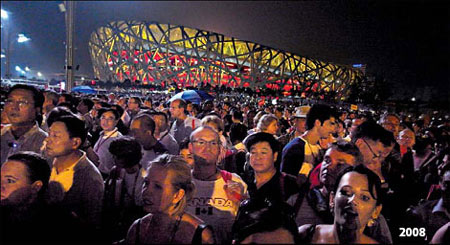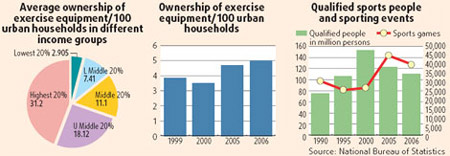|
|
 |
|
30th Anniversary Celebrations
Economic Development
New Rural Reform Efforts
Political System Reform
Changing Lifestyle
In Foreigners' Eyes
Commentary
Enterprise Stories
Newsmakers
Photo Gallery
Video and Audio
Wang Wenlan Gallery
Slideshow
Key Meetings
Key Reform Theories
Development Blueprint
Li Xing:
Teachers like Li need our support Alexis Hooi:
Going green in tough times Hong Liang:
Bold plan best option for economy By leaps and bounds
By You Nuo (China Daily)
Updated: 2008-08-18 10:43
  Gold means business. It also does in sports. But what Olympic gold medals mean in the Chinese context is not just how much the medals are worth - no matter how many the national team wins. Indeed, whether China wins the most 2008 Summer Olympics gold medals or not, sports here has grown into an industry thanks to economic reform, and is looking to grow further in this nation of 1.3 billion. So let's take a look at the sports business as the Beijing Olympics is still going on, whose iconic venue is the Bird's Nest, the nickname for China's National Stadium as shown in Wang Wenlan's 2008 color photo. The picture was taken after the Olympic opening ceremony on August 8, when swarms of the spectators were going home, with the 3.2-billion-yuan ($465.82 million) facility still beautifully lit in the background.
"Wow!" one may exclaim, "3.2 billion yuan? How much is that in US dollars?" Somewhere between $450 and $500 million, depending on the date of the exchange rate you choose to use. But don't "Wow" yet. A much larger and longer effort, amid the development of the market economy, has been spent on sports and athletic-related equipment as you can see on the chart showing the rise in home exercise equipment between 1996-2006. Some people tend to believe that the Olympic medals that China wins are collected by just a few official handpicked elite athletes, while the rest of society has hardly developed any sports interests, save for NBA, soccer, badminton and ping-pong. Yet how can officials tell which boy or girl has an athletic talent or not without spending money on mass competitions? In fact, what China does is keep and adjust its account, like a national databank, of individuals who are qualified with the State Physical Training Standards in every year. The latest account, taken in 2006, included 110 million men and women, who qualified in some 4,000 sporting events from the city-county level above. In addition, all schools, from primary schools to colleges, run their school competitions every year. Of course, from all those people, there cannot be many who can meet a set of very high standards and represent the nation in the Olympics. But even if only one person is selected out of 1 million, you still get a 110-strong team, with enough chance to grab a few medals.
See the black-and-white photo of a marathon in Beijing in 1985? To have all those people mobilized, you would need an effective State, admittedly. But apart from that, you would need money, and true mass interest.

 
 |